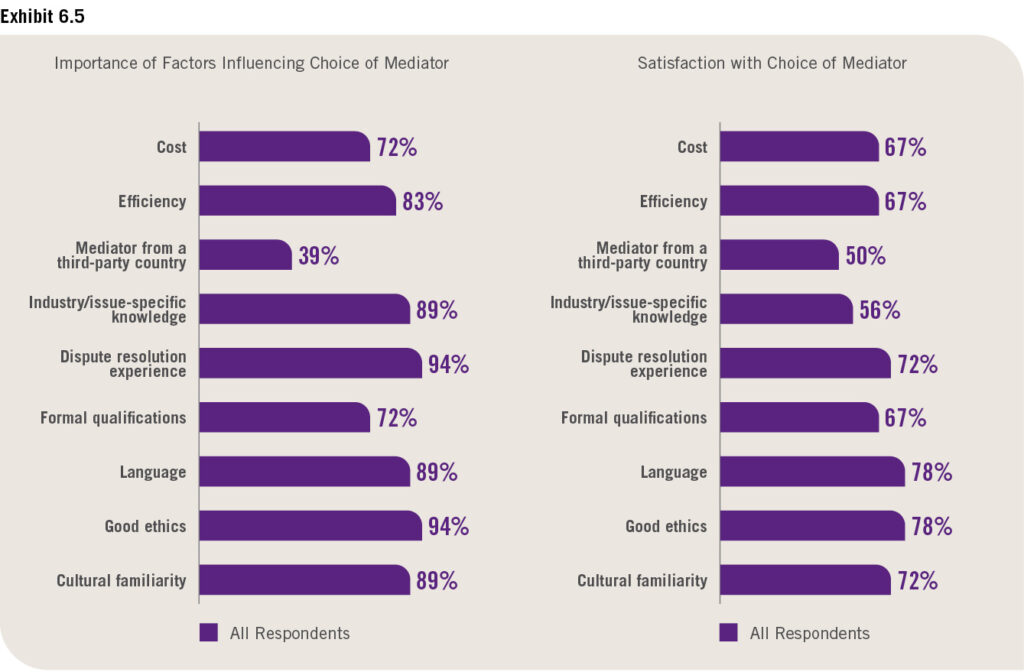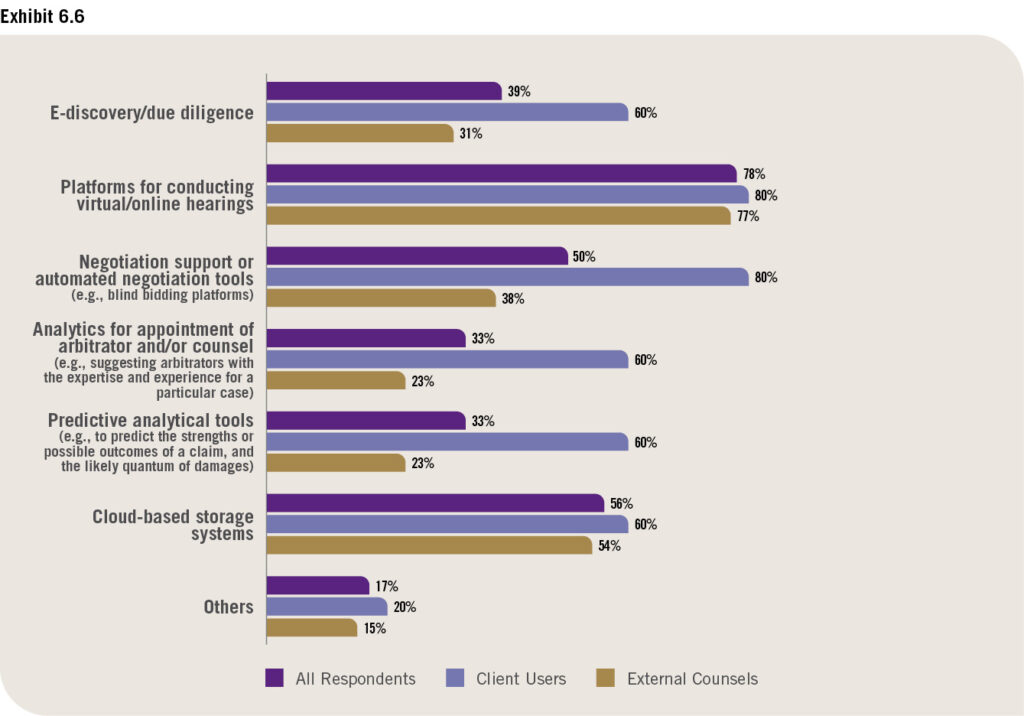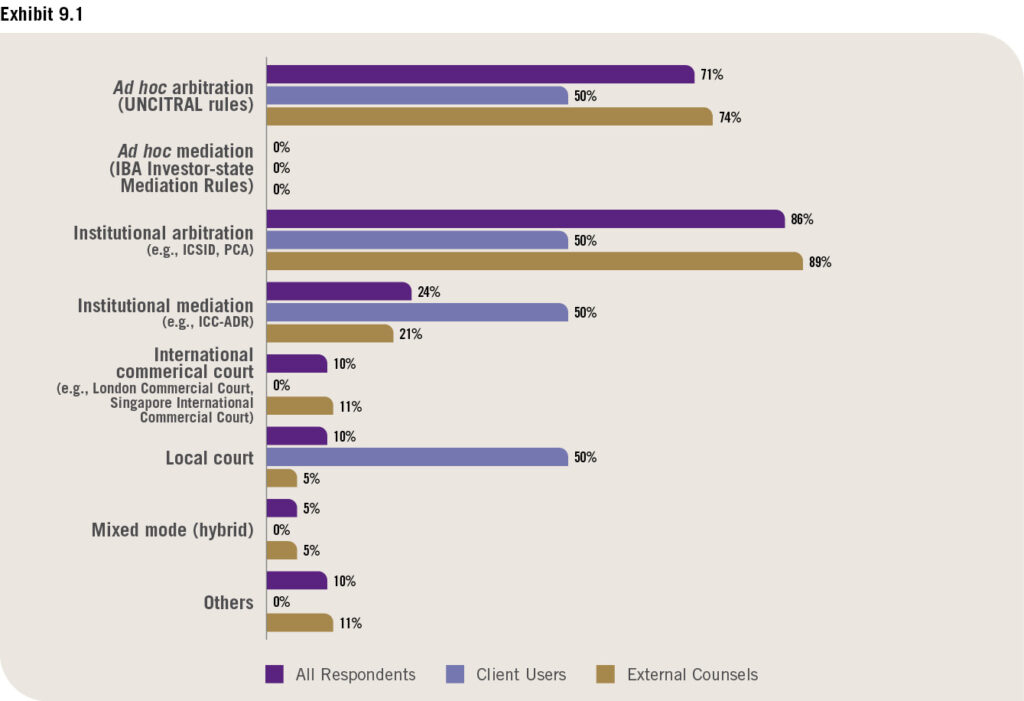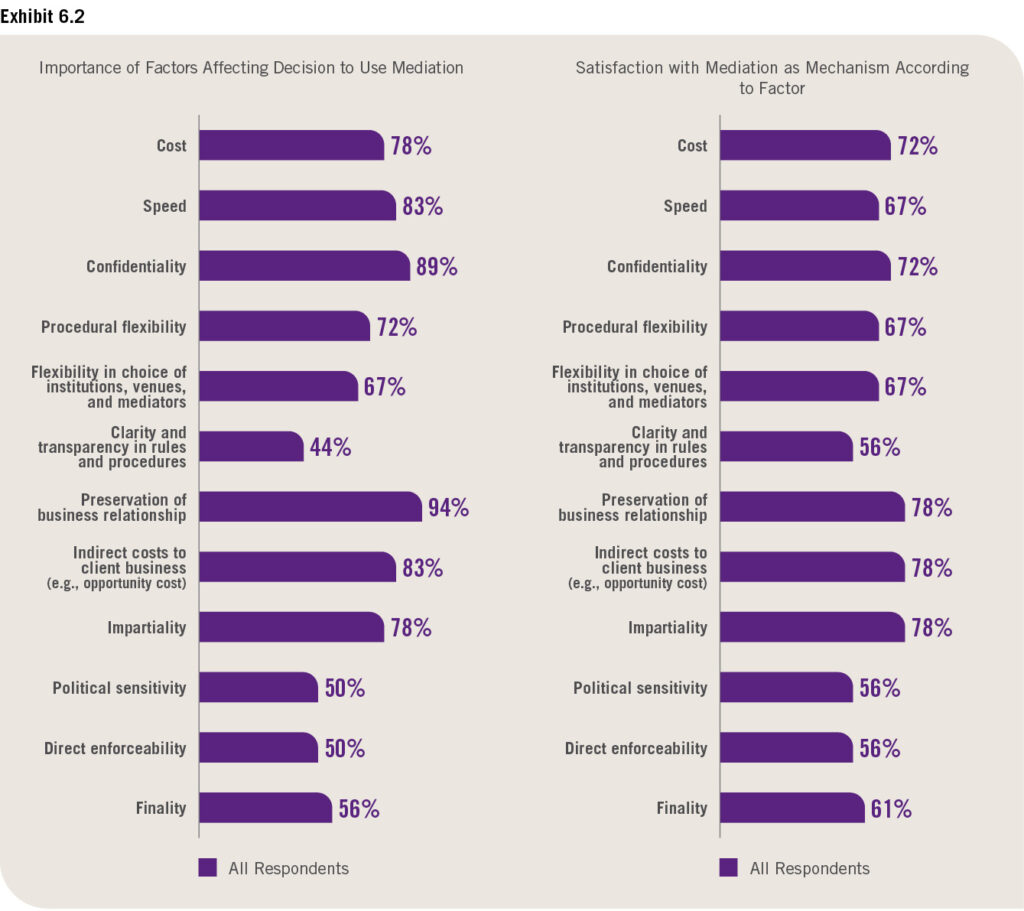The Singapore International Dispute Resolution Academy (SIDRA) launched its International Dispute Resolution Survey: 2022 Final Report on 31 August 2022. The SIDRA Survey is commissioned by the Singapore Ministry of Law and is into its second iteration, with the first SIDRA Survey Report published in 2020.
The 2022 Final Report continues SIDRA’s global study into how users of dispute resolution mechanisms, including businesses and their legal representatives, make decisions about resolving cross-border disputes and provides possible future trends.
The SIDRA Survey is:
- 100% user-centric as all respondents are users of cross-border commercial dispute resolution mechanisms or investor-state dispute settlement mechanisms. The respondents are identified as either Client Users (corporate executives and in-house counsel) or External Counsel (dispute resolution lawyers and corporate lawyers). Views of neutrals, academics, institutional providers and other non-user stakeholders are not represented in the Survey;
- Comprehensive as no single dispute resolution mechanism was examined in isolation;
- Based on user experiences and not preferences. Respondents were directed to the particular dispute resolution process they have experience with and were then asked to respond to a series of specific questions in relation to that mechanism;
- Focused on cross-border disputes only and not domestic disputes;
- Distributed internationally in all six official UN languages; and
- Segmented into five sections (international commercial arbitration, international commercial mediation, international commercial litigation, mixed mode (hybrid) mechanisms and investor-state dispute settlement).
Client Users and External Counsel who engaged in cross-border commercial or investor-state dispute resolution between 2019 and 2020 were asked to respond to the SIDRA Survey. The Survey was answered by 139 respondents from 25 countries, with 181 responses across five sections of the Survey.
This post looks at some of the findings related to why Client Users and External Counsel choose to mediate their disputes and compares some of the results of the 2020 and 2022 Final Reports.
Why Choose Mediation
A majority of the respondents resorted to international commercial mediation to resolve their disputes because they were contractually obligated to do so (67%) or because external counsel had advised them to make use of mediation (61%).
Most of the respondents found that mediation is an effective dispute resolution mechanism to enable them to preserve business relationships (94%) and uphold confidentiality (89%). This is unsurprising as the confidential nature of mediation is a draw for parties who seek to preserve their business relationships.
Respondents were satisfied with the following characteristics of mediation: preservation of business relationships (78%), impartiality (78%) and confidentiality (72%). In the 2020 Final Report, respondents were also satisfied with impartiality and confidentiality.
How Mediators are Chosen

In choosing mediators, the top factors influencing the respondents’ choice were dispute resolution experience (94%), good ethics (94%), industry/issue-specific knowledge (89%), language (89%) and cultural familiarity (89%). Only 39% of respondents thought that it was important for a mediator to be from a third-party country.
In terms of satisfaction, respondents were satisfied with the language skills (78%) and good ethics (78%) of their chosen mediator. They were also satisfied with the dispute resolution experience of their mediator (72%). This data coincides with the findings found in the 2020 Final Report.
Interestingly, only 56% of respondents were satisfied with the industry/issue-specific knowledge of their mediator. This suggests that most respondents rate the subject-matter expertise of mediators as important. For instance, parties to investment-related, intellectual property or technology disputes may require mediator expertise in these areas. At the same time, it is important to note that there is a strong and ongoing debate in the professional mediation community about whether mediators’ expertise should be process-related rather than subject-matter related.
Technology and Mediation

Over 78% of the respondents found platforms for conducting virtual/online mediation useful. In the 2020 Final Report, only 35% of respondents found the same platforms useful.
More technologies are being embraced now, compared to the data presented in the 2020 Final Report. 50% of respondents found negotiation support or automated negotiation tools as useful, up from 29% in the 2020 Final Report. 39% of respondents thought e-discovery/due diligence useful, up from 33%.
These differences are unsurprising given that the use of technology increased exponentially during the pandemic and has also made online proceedings more cost and time efficient.
Usefulness of analytics for appointment of mediator and/or counsel has gone down from 36% in the 2020 Final Report to 33% in the 2022 Final Report. This may be explained by the fact that External Counsel experienced in mediation sometimes know mediators personally and think that this may influence the way a mediation is conducted. However, these factors become less relevant when using technology and thus may not be of much use for External Counsel.
The Emergence of Mediation in Investor-State Dispute Settlement

Arbitration continues to be the most commonly used dispute resolution mechanism for investor-state disputes. This is followed by mediation. This is a development from the results found in the 2020 Final Report, where respondents ranked arbitration first, followed by international courts and local courts with respect to investor-state disputes.
The rise of mediation in the context of investor-state disputes has not gone unnoticed. In the Possible Reform of Investor-State Dispute Settlement which was conducted by the UNCITRAL Working Group III in its thirty-ninth session, it was noted that there was a “general interest in pursuing further work on alternative dispute resolution (ADR) methods, including mediation, with a view to ensuring that these methods could be more effectively used”. Recently, the new International Centre for Settlement of Investment Disputes (ICSID) Mediation Rules went into effect, which are specifically designed for the mediation of investment matters involving States or Regional Economic Integration Organisations and their respective sub-divisions or agencies. Under the new ICSID Mediation Rules, parties can institute mediation proceedings based on a prior party agreement (Rule 5). Parties that do not have a prior written agreement may institute mediation proceedings by filing a Request with the ICSID Secretary-General (Rule 6).
Overall, respondents were very satisfied with the factors they ranked important in deciding to mediate their disputes and in choosing their mediators. More and more users are taking notice of mediation, especially since it allows disputing parties to resolve their disputes fairly quickly while maintaining important business relationships. It seems that the rise of mediation as an effective tool to resolve cross-border disputes – whether commercial or investment disputes – will continue.
2023 SIDRA Survey
The international dispute resolution landscape continues to evolve. More mediation and arbitration institutions, as well as international commercial courts, are working together to create mixed mode (hybrid) dispute settlement protocols. The Singapore Convention on Mediation has encouraged more states to re-examine their respective laws on alternative dispute resolution. The SIDRA Survey 2023 will seek to understand these changes and how it has impacted user perception and experience in international dispute resolution.
The 2023 SIDRA Survey calls for responses from participants who have international dispute resolution experience, including corporate executives, in-house counsel, lawyers and legal advisers. The 2023 SIDRA Survey is focused on user experiences with arbitration, litigation, mediation, hybrid dispute resolution mechanisms and investor-state dispute settlement. It also includes two new sections on intellectual property and technology disputes. The SIDRA Survey 2021 will examine and study users’ perspectives, preferences, and experiences in international dispute resolution during 2021-2022 and provide preliminary findings in August 2023.
The SIDRA Survey 2023 will be open until 30 December 2023.
Editor’s Note: Nadja Alexander is the Director of the Singapore International Dispute Resolution Academy (SIDRA). She is also an Editor of the Kluwer Mediation Blog.
________________________
To make sure you do not miss out on regular updates from the Kluwer Mediation Blog, please subscribe here.




I have previously perused out this substance. That is extremely fascinating. Gratitude for sharing this instructive data. I’m sitting tight for your next data.
single family office Singapore structure